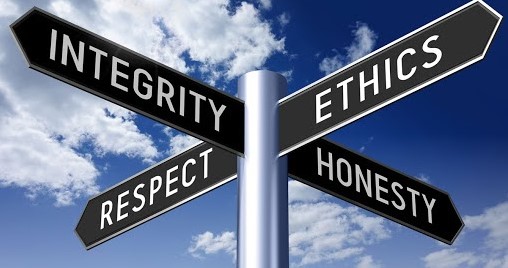The field of philosophy that investigates the moral principles that govern a person's behavior is called Ethics or Moral Philosophy.
Ethics evaluates human actions and the values that underlie them.

The study of ethics forces us to ask ourselves - what is right? What is wrong? and Why?

The field of ethics involves systematizing, defending, and evaluating concepts of right and wrong behavior. The study of ethics has three main branches:
Metaethics: The nature of ethics and moral reasoning, the origin and meaning of ethical concepts.
Normative Ethics: This branch of ethics attempts to formulate principles about how we should live and how we ought to act.
Applied Ethics: Addresses the moral acceptability of specific actions, policies, and practices. Applied ethics uses the conceptual, analytical, and theoretical tools and frameworks of normative and metaethics and tries to provide solutions to controversial dilemmas. Examples include Engineering ethics, Environmental ethics, Biomedical ethics, and Business ethics
What is Engineering Ethics?
A Definition
Engineering Ethics, which falls under applied ethics, governs the standards of behavior and moral principles that describe how an engineer should act within the diverse situations they find themselves within the engineering profession.
These situations can be broadly divided into two categories:
Macro-Ethical Situations
Involve collective, social responsibility of the engineering profession and societal decisions about technology.
Examples: sustainability, social justice, bioethics, technologies created by engineers
Micro-Ethical Situations
Focuses on individuals and the internal relations of the engineering profession.
Examples: treatment of workers, intellectual property, interacting with clients, health and safety in the workplace
Challenges
Engineers are often removed from the consequences of their projects, which can partially blind them to the long-term or downstream ethical implications of their work. As such, it is necessary for engineers to maintain ethical awareness and long-term mindsets throughout the lifecycle of their projects.
Engineers work with and affect people across cultures with potentially different, competing conceptions of right and wrong. As such, engineers have to be cognizant of these conceptions when applying ethical principles to their work.

Main Types of Ethical Theories:
Ethical theories posit answers to the questions about what is right or wrong behavior in a particular scenario. Some example theories are:
Consequentialist: also referred to as Theological Ethics, the belief that a morally right action will produce a good consequence. Consequentialism includes theories such as Utilitarianism (the best choice will result in happiness for the greatest amount of people), Egoism (the best choice will result in happiness for oneself), Ascetism (the best choice leads to a life of selflessness), Altruism (the best choice results in happiness for everyone except oneself), Rule Consequentialism (the best choice follows the rules), and Negative Consequentialism (the best choice minimizes bad consequences).
Non-Consequentialist (Deontology): focuses solely on whether an action is right or wrong within itself, and the obligations and duties of those involved. Includes Divine Command Theory (the best choice is what God would want), Natural Rights Theory (the best choice takes into consideration the natural human rights), Categorical Imperative (the best choice is dependent on its motives), Pluralistic Deontology (the best choice follows the seven prima facie duties), and Contractarian Ethics (the best choice is obvious if there were no biases).
Virtue Ethics: focused on the character of the person making the choice rather than the impact of the choice they made. Includes the theories of Eudaimonism (the best choice leads to well being), Agent-Based Theories (the best choice exemplifies our best character traits), and Ethics of Care (the best choice exemplifies virtues prominent in women such as nurturing and patience). By Branch / Doctrine Ethics. (n.d.).
Retrieved from PhilosophyBasics.com
